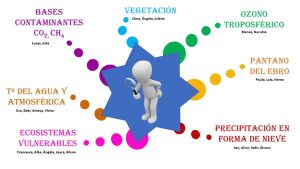Climate Detectives Projects 2022-2023
Project title: CLIMATE CHANGE IN CANTABRIA
Team: ZAPATOPE
I.E.S DR. JOSÉ ZAPATERO DOMÍNGUEZ CASTRO URDIALES ESPAÑA 20 Student’s age: 14-15 years old
What has changed in Cantabria, so that in recent years we have gone from wearing a jacket in summer to being able to walk down the street with just a T-shirt?
¿Qué ha cambiado en Cantabria, para que en los últimos años hayamos pasado de llevar una chaqueta en verano a poder ir por la calle con tan solo una camiseta?

Cantabria has always been known for being a land of green fields, the rains were continuous throughout the year; for being a good place to rest as its temperature in summer allows you to sleep in one go and for its beautiful beaches, although few were brave enough to take a dip in the Cantabrian Sea.
Our climate made the jacket an essential accessory.
However, all this is changing. It is not so cold anymore, although we are still a community that shelters from the high temperatures, it hardly rains, fires have increased and bathing in our sea at any time of the day is no longer for the brave.
Our group of 4th ESO have investigated different fields in order to look for scientific evidence of climate change in Cantabria. The different fields of research have been based on the analysis of data obtained in: EO Brower, Aemet, Meteocantabria and Bluedot Observatory.
Cantabria siempre fue conocida, por ser una tierra de verdes campos, las lluvias eran un continuo a lo largo del año; por ser buen lugar para el descanso dado que su temperatura en verano te permite dormir de un tirón y por sus bonitas playas a pesar de que eran pocos los valientes que se atrevían a darse un baño en el mar Cantábrico.
Nuestro clima hacía de la chaqueta, un complemento imprescindible.
Sn embargo todo esto está cambiando. ya no hace tanto frio aunque seguimos siendo una comunidad refugio de las altas temperaturas, apenas llueve, han aumentado los incendios y darse un baño en nuestra mar a cualquier hora del día, ya no es de valientes.
Nuestro grupo de 4° ESO hemos investigado distintos campos para ,buscar evidencias científicas del cambio climático en Cantabria. Los diferentes campos de investigación se han basado en el análisis de los datos obtenidos en: EO Brower, Aemet, Meteocantabria y Bluedot Observatory.

It has been observed that changes have occurred over the 50-year periods considered in the thermal regime, with an average temperature increase of 2ºC and a gradual decrease in precipitation in the water regime. As well as increasingly frequent episodes of fire. There has been a clear transition throughout Cantabria during the current century towards a mild climate with extreme temperature episodes.
Se ha podido constatar que se han producido cambios a lo largo de los periodos considerados, estos son de 50 años, en el régimen térmico con un aumento de temperatura media de 2ºC y en el hídrico una disminución paulatina de la precipitación. Así como episodios cada vez más frecuentes de incendios. Se constata una clara transición en toda Cantabria a lo largo del siglo actual hacia un clima suave y con episodios extremos de temperatura.
What’s next:
We are going to make our study known, both to our school colleagues and to the rest of the students of the schools and institutes of Castro Urdiales and, for greater visibility and dissemination, we will present it on Castro’s local radio.
Vamos a dar a conocer nuestro estudio, tanto a los compañeros de nuestro centro como al resto de estudiantes de los colegios e institutos de Castro Urdiales y, para una mayor visibilidad y difusión lo presentaremos en la radio local de Castro.
This project was automatically translated into English.
Projects are created by the teams and they take the full responsibility of the shared data.
← All projects




